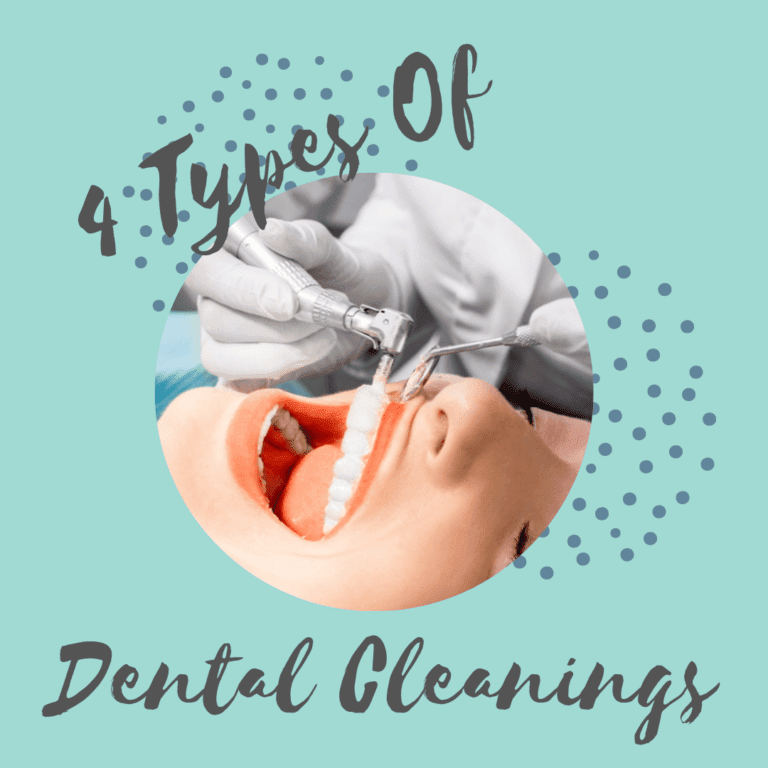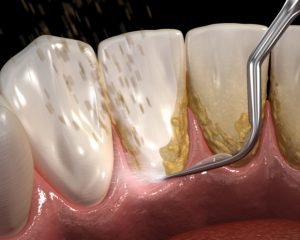4 Types of Dental Cleanings

Do you love drinking a cold beverage on a hot summer’s day just to feel the dull sting of tooth sensitivity? Are root canals one of your favorite past times? Is it your goal to one day have a necessary tooth extraction because of severe decay? Let’s be real, no one wants these things. In fact, many people would do anything to avoid them.
Luckily, there is one key thing you can do to prevent these things. All you need to do is visit your dentist every six months for a dental cleaning. Dental cleanings are essential preventative dental treatments that remove excess plaque, tartar, and bacteria from the surface of your teeth in order to minimize the risk or severity of tooth decay and gum disease. Depending on your individual case, there are four different types of dental cleanings that can benefit you:
#1: Prophylaxis Cleaning
Although it sounds complicated, prophylaxis simply means an action used to prevent disease. With that being said, a prophylaxis cleaning is simply a preventative cleaning. This type of cleaning is commonly used for individuals who have overall good dental health and are simply maintaining this health. During a prophylaxis cleaning, plaque and tartar are removed from the front and back of teeth, as well as from in between them. Dental prophylaxis cleanings are recommended at least twice a year to keep your teeth and gums healthy, however high risk patients may require them every 3-4 months.

#2: Scaling and Root Planing
Scaling and root planing, also known as a deep cleaning, is performed on patients who are affected with gum disease such as gingivitis or periodontitis. There are two main steps to this type of cleaning. First, plaque and tartar are removed from the visible surface of the teeth, as well as from the gum pocket below the gum line. This is known as scaling. Once all the gum pockets have been cleared of plaque and tartar, then the root surface with be smoothed. This is known as planing and will make it easier for your gums to reattach themselves to the teeth. In some cases, scaling and root planing may require local anesthetics and multiple dental appointments to complete.
#3: Periodontal Maintenance
For those who are affected with gum disease, periodontal maintenance is essential. Although gingivitis may be reversible with treatment, periodontitis is not. Because both types of gum disease are progressive and will continue to get worse if they are not treated. This can eventually lead to tooth loss. Periodontal cleanings are performed more frequently than preventative cleanings and are usually continued until the symptoms have been properly managed.
#4: Gross Debridement
This type of cleaning is performed when a regular teeth cleaning is not enough. It is usually used for people who have put off dental visits or teeth cleanings for awhile and have a significant buildup of plaque and tartar. During a gross debridement, plaque is first removed with a scaler tool. Because tartar is hardened plaque and it has been in place for awhile, a special electric tool is usually required to loosen and remove tartar from the teeth. Once this is complete, a regular prophylaxis cleaning will be performed.
Dental cleanings are especially important for preventing tooth decay, preventing & treating gum disease, and removing plaque and tartar from your teeth. While most people can expect to have a prophylaxis cleaning, some may require scaling and root planing, periodontal maintenance, or gross debridement. Nevertheless, each cleaning is bound to help your oral health and prevent painful and inconvenient dental problems.






Recent Comments